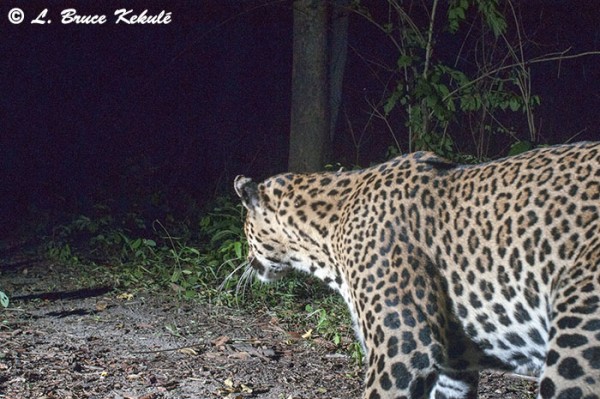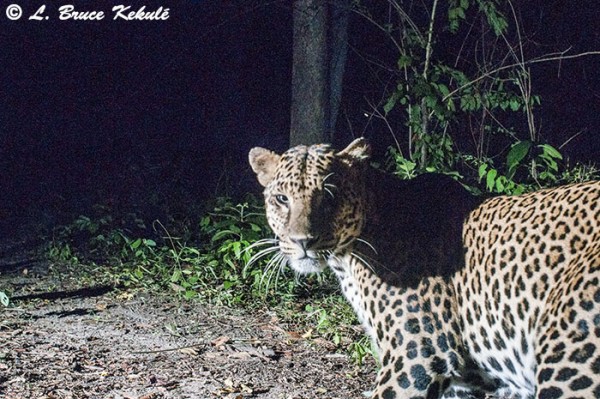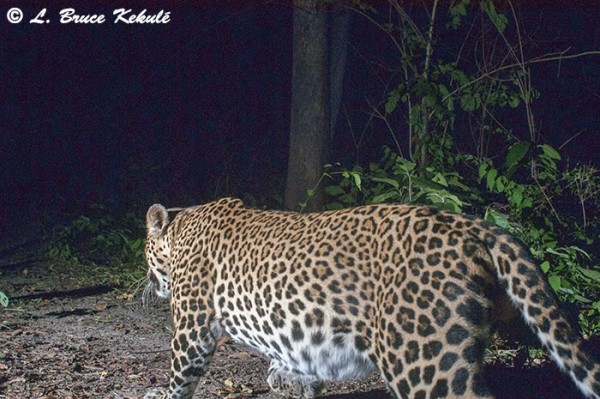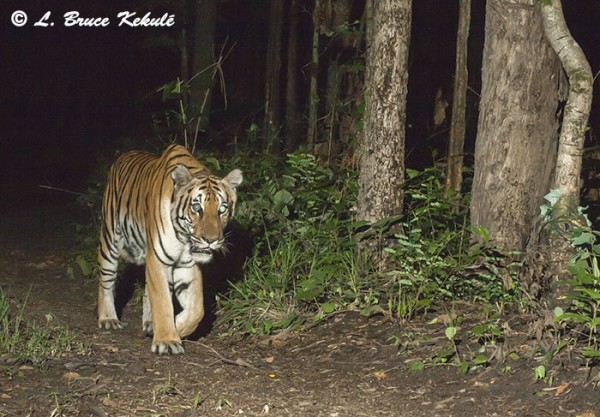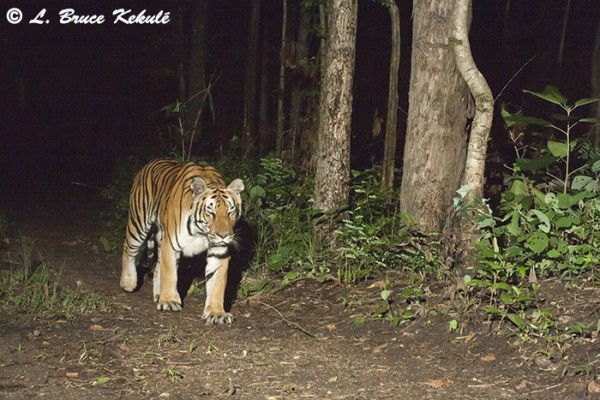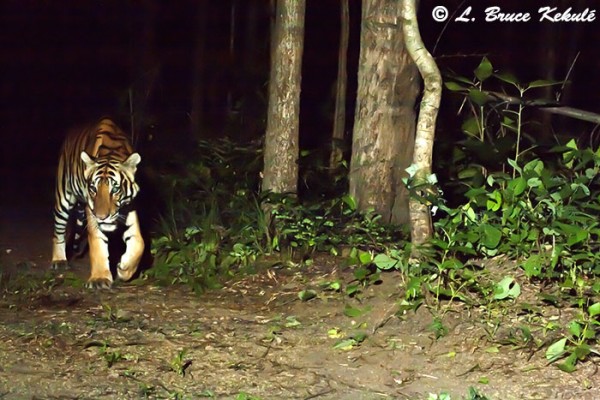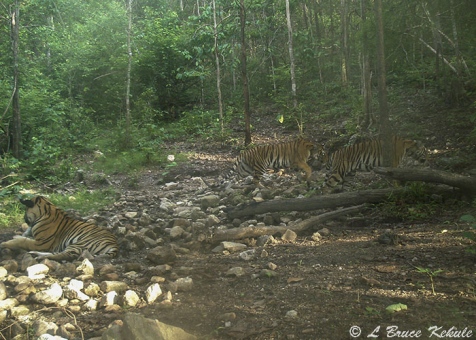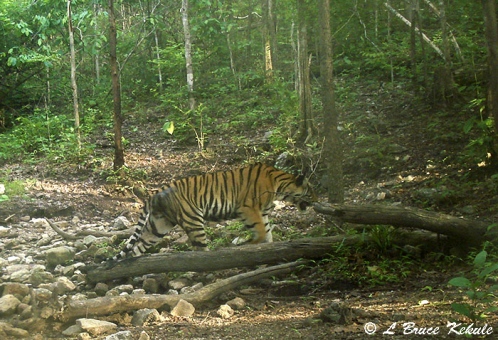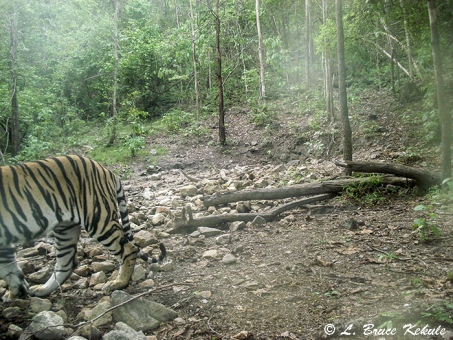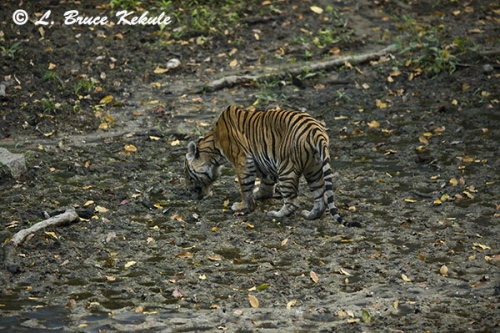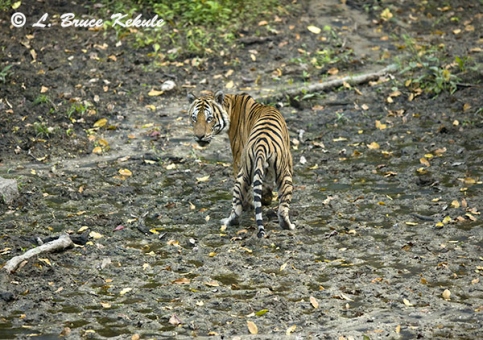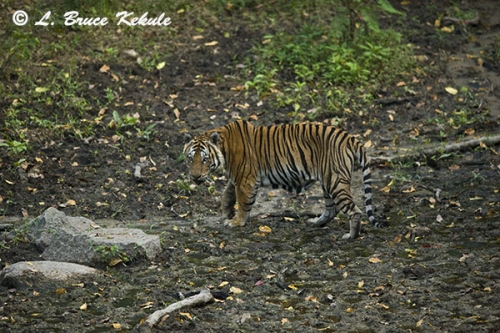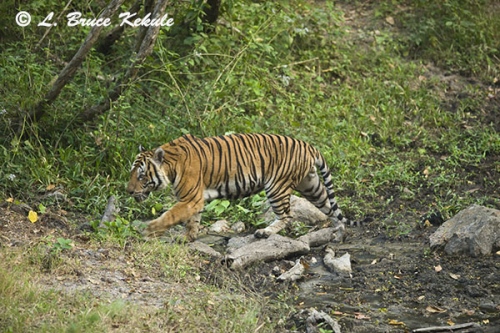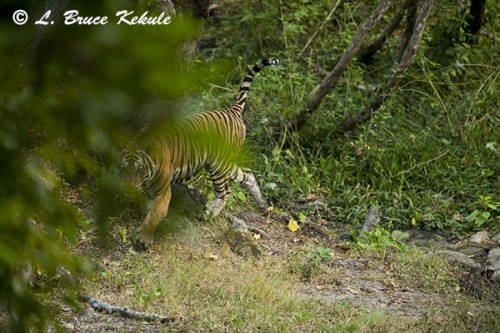Posts Tagged ‘wild cat’
Nikon D300s catches an Asian Leopard
A male cat shows off its family jewels…!
A male leopard with its reproductive organs in full swing…Shot No: 6.
Back at the end of June, I pulled a card from my D300s DSLR trail cam at the ‘big cat trailhead’ and when I looked, I did not see anything so I threw the card in the with the rest of my CF cards.
Shot No: 1
It was somehow put into my D3s but fortunately I did not format it. After doing some work while in the forest last week, I pulled both cards (Nikon D3s had two CF card slots) and downloaded them.
Shot No: 2
Imagine my surprise…! There was a male leopard and he had been captured at night while walking past the D300s. Where the heck did that come from…?
Shot No: 3
I guess my short-term memory is on the blink. Unfortunately, the other two flashes were dead creating a horrible shadow…!
Shot No: 4
Needless to say, I’m lucky I did not lose these shots and of course, shot No: 6 is my favorite…enjoy…!
Shot No: 5
Nikon D300s set to low continuous.
Nikon 35mm manual lens.
ƒ11 @ 1/125 ISO 400
Single SB-28 set to full (the other two flashes did not fire and were dead).
SSII sensor #6 chip – Pelican 1150.
Indochinese tiger ‘eye lash’ speed…!
A Canon 400D trail cam catches a male tiger
Old green eyes’…out on a ‘night prowl’…1st shot…!
A couple of days ago, I was checking my cams and got to my Canon 400D on a forest road somewhere in the Western Forest Complex of Thailand. When I got to the cam, it was still working but only one flash three feet above the cam was firing hence the ‘eye-shine’ . The other two flashes were dead…! Life on two Canon Lithium batteries in 30 second power save mode is excellent so I left them just to see how long they would really last….!
Tiger squinting…..2nd shot.
The flash that fired was a SB-26 which I normally set for slave but somehow the settings was on full-power…needless to say, I was delighted and did back-flips when I saw a tiger again, in about the same position as the female back in June in two shots. In both instances, the tigers had their eyes open on the first shot and squinted by the second in almost the same positions. This reaction time is measured in milliseconds…!
Last month’s female tiger…..1st shot.
Then they both jumped out of the frame before the camera could shoot again. This is 100% luck….also shifted the 400D over a tad to the left for better composition. I have included last month’s female tiger shots so a comparison can be made without having to flip back to the old post.
Female squinting…..2nd shot.
All I can say, it boggles the mind but shows how fast tigers can react……Enjoy…!
Canon 400D set to continuous
Nikon 50mm ƒ1.4 manual lens
Nikon SB-26 set to full power.
1/125 – ƒ8 ISO 400.
SSII sensor #6 chip – Pelican 1150
1st shot – cropped and the rest normal size.
A Jumping Tiger: Nikon D300s DSLR catches a big cat
The speed and reaction time of an Indochinese tiger is measured in milliseconds….!
The video is a bit raunchy and music is strong but I wanted something else for a change…! This is the most amazing behavior of a tiger I have ever seen.
I set my Nikon D300s DSLR trail cam deep in the forest at a mineral spring where all of Thailand’s large wild mammals like elephant, gaur, banteng, tapir and sambar plus others come for ‘life-giving’ minerals and a drink, and where tigers coming looking for prey.
This cam (set to manual 1/125 – ƒ8 – ISO 400) with a 35mm lens with a Snapshot Sniper SSII sensor fires-off salvos of 8 frames a second every time it records motion. The Nikon D300s was perfect for this location
I was hoping to catch a tiger and thought I might get lucky…but after going through the files, I found 13 photos of a tiger jumping away from the cam. This action footage is my best so far of the tiger in Thailand. The cat is not exceptionally sharp but movement never is and it does not have to be…..!
Amazingly, this male tiger heard the first shutter and reacted in less than three frames and started moving away in what I would like to say, blinding speed…! He looks to be mature judging from his scrotum. This place is truly the last great tiger haven in Thailand and worthy of it’s ‘World Heritage Site’ status…!
All I can say, it’s going to be tough to top this sequence….!
Enjoy…!
TIGER AND BANTENG – Sony W30 set
Tiger mother and two full grown cubs.
Recently, I pulled a Sony W30 camera trap from a mineral deposit in the Western Forest Complex and found some amazing photos of a mother tiger and her two cubs. It is very rare to see a tiger family on a trail cam. These amazing creatures usually do not hang around when it starts flashing at them…but I got some great shots shown here.
Mother and cub.
The two cubs leaving the mineral deposit.
Mother on the way out.
Another tiger visits the camera.
Banteng have now become quite rare in Southeast Asia but thrive in two wildlife sanctuaries in Thailand; one in the east and one in the west. Here are some shots of these beautiful wild cattle. The old bull looks like he is having a heck of time with the moths.
Banteng herd at the mineral deposit.
Old banteng bull and moths after a big rain.
Indochinese tiger sequence
The following images are my best of an Indochinese tiger caught in late afternoon in Huai Kha Khaeng Wildlife Sanctuary, Uthai Thani province, Western Thailand on December 11, 2009. This male moved through the waterhole and did not stay. I had just enough time to get 20 lucky shots of the big cat. A rare sighting of an elusive carnivore..!
Tiger moving into waterhole at 5 pm
Tiger takes a quick drink.
Tiger takes a first look at my location.
Tiger stops and take a second look.
Tiger moves on.
Tiger takes one last look.
The highlight of my wildlife photographic career and a dream come true….!
Photos taken with a Nikon D700 and a 400mm f 2.8 lens on a Gitzo tripod. Exposure: 1/60 sec; f/2.8; ISO 800
Leopards camera trapped on a kill in Huai Kha Khaeng Wildlife Sanctuary
Leopards at a sambar kill in Huai Kha Khaeng Wildlife Sanctuary, western Thailand. This rare camera trap photo was a complete surprise to see a yellow phase mother leopard and a young black cub. There are many black leopards in this protected area and it is a tribute to its status as a World Heritage Site.



